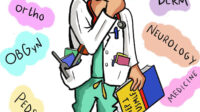As part of her students’ first anatomy examination, Leslie A. Hoffman, PhD, assigned her first-year students a two-part self-assessment. Hoffman is an assistant professor at Indiana University School of Medicine.
Pre-exam, each student had to self-reflect on their exam prep and study techniques–plus how well they expected to perform on exam day. Post-exam, each student was asked to self-reflect and discuss how, based on their actual anatomy exam scores, they could or would upgrade or redirect their future study and learning strategies.
When she read her students’ self-reflections, Dr. Hoffman found a mismatch between some students’ pre-exam confidence and predictions (high) and how they actually performed (badly or failed). In contrast, her high-scoring, ace students had, pre-exam, underestimated their own knowledge and test scores.
Most of Hoffman’s students had excelled as undergraduates. But now, as first-year medical students, their self-assessments showed that they didn’t know what they didn’t know.
WHAT: Metacognition and Cognition: Are they Different?
Cognition: Generally, cognition is the process of obtaining information from the world around us and mentally processing and interpreting that information to give it meaning. Cognition has many component parts, including perception, attention, learning, memory, language, emotion and problem solving.
Metacognition: Metacognition is knowledge about our knowledge and learning. It includes two component parts: what we know about our own learning (or cognition) and how we are able to control and regulate how well we learn (or cognate) by assessing, re-assessing or updating our own learning practices.
The author of this Harvard Business Review article analogizes metacognition with driving in a foreign city. While driving, the author posits that it takes “heightened self-awareness to avoid getting lost, so you need to be aware of the ways in which your mental map may be incomplete. You also need to actively check your assumptions against passing signs and landmarks.”
WHY: Metacognition Matters in Medical Education
About her study of first-year anatomy students, Dr. Leslie Hoffman concludes: “Ultimately, the goal of improving medical students’ metacognitive skills is to ensure that these students will go on to become competent physicians who are able to identify their areas of weakness, create a plan to address their deficiencies, and monitor and evaluate their progress to meet their learning goals.”
However, in that journey from student to practitioner, there are a few hurdles to overcome, starting with getting admitted to medical, dental or nursing school in the first place.
According to this Fobes article, in 2020, more than two dozen medical schools reported a 25 percent increase in applicants (compared with 2019).
Some attribute the increased interest in medical careers to our COVID-19 pandemic. Others call it “the Fauci affect.”
While applicant numbers have risen, acceptance rates have not. Therefore, in order to stand out in that medical school applicant pool, students must have higher grades, sterling standardized test scores and real-world or volunteer clinical experience.
Once accepted, medical students have to learn more than their counterparts in previous decades—but all within the traditional, four-year timeframe.
Other 21-century learning challenges include spanning the evolving research-to-practice gap; changing and merging health systems; altered staffing patterns; and shifting public and commercial payor reimbursements. So from admission to education, from medical to dental to nursing schools, we are asking our students to get and be more prepared for real-world practice.
WHERE Medical Educators Can Model and Teach Metacognition
By inviting people to put forward a hypothesis or argument, then deconstruct their own thinking behind that argument, Socrates taught or facilitated metacognition in the town square in Athens. In that town square, the Greek philosopher challenged his opponent debaters to deepen their understanding of what they knew (or didn’t know) and how they knew it.
In the 21st-century, medical educators can promote student metacognition in both classroom and clinical settings.
For example, as part of her metacognition practices, scientist and biology professor Kimberly D. Tanner assigns her students a set of examination preassessments and post-assessments to self-assess their own scientific beliefs, knowledge bases and learning. These self-reflections can happen in the formal learning environment (classroom) or offline via the students’ own, self-directed journal writing.
Other venues for advancing student metacognition include all-group discussions, medical rounds or other bedside encounters, small-group tutorials or one-to-one student-educator meetings.
HOW to Teach Metacognition
In a healthcare setting, metacognitively aware clinicians know how to continuously self-evaluate their own clinical research, reasoning and approach to patient care.
In the educational setting, metacognitively aware and adept instructors must infuse their pedagogical practices with metacognitive education—starting by modeling metacognition for their students.
In addition to modeling, educators can actively teach metacognition via other strategies, including developing an interactive teaching style; issuing timely student feedback; conducting think-aloud sessions (in which instructors share their own reasoning processes); and leading brainstorming techniques that force students to interrogate and challenge their scientific, diagnostic or implicit-bias assumptions. Narrative medicine practices, including critical and analytical “close readings” of narrative texts, can improve students’ listening skills, patient connection and cognition. Columbia University’s Dr. Rita Charon, the originator of the field of narrative medicine in the U.S., defines this interdisciplinary practice as “the ability to acknowledge, absorb, interpret, and act on the stories and plights of others.”
BoardVitals Can Be Your Metacognition Partner
The bottom line: Metacognition practices extend beyond quantitative goals, outcomes and measures such as students’ test scores. Instead, metacognition nudges and equips our learners toward self-assessing–and, when needed, toward self-correcting–their learning and study practices.
As national experts in developing content and question banks that foster thoughtful, interactive learning, BoardVitals can develop an educational package that will help your students seek and achieve a level of metacognition that, ultimately, will make them into better clinicians.




